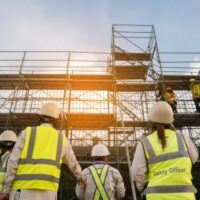Does the Scaffold Law Only Apply to Construction in New York?

Personal injury lawyers in New York are quite familiar with the Scaffold Law, and it provides workers with unique protections not seen anywhere else in the nation. As incredible as the law is, however, it can be a little difficult to interpret. Besides the rather vague definition of a “gravity-related incident,” it can apply to a wide range of potential workplaces. Aside from construction sites in New York, what other workplaces could the Scaffold Law apply to?
What Is the Scaffold Law?
The Scaffold Law is more than 100 years old, and it was originally introduced to help construction workers in New York City. These workers were tasked with building some of the most iconic structures of the era – including the Empire State Building. However, they had virtually zero safety protections, and many lost their lives due to falls. There are numerous incredible photos of construction workers balancing on steel beams, thousands of feet above New York city – and with absolutely no fall protection equipment.
The Scaffold Law states that if a worker suffers a gravity-related injury or fatality in New York, they do not need to go through workers’ compensation. Instead, they can hold their contractor or the property owner “strictly liable.” In other words, injured workers and the families of deceased workers can sue these parties directly – often without even establishing negligence. This is an important legal protection, and it can lead to much higher levels of compensation compared to the average workers’ comp claim.
What Kind of Workers Does the Scaffold Law Protect?
While the Scaffold Law was initially introduced to protect construction workers, it actually applies to a much wider range of potential plaintiffs. It doesn’t really matter whether the worker is engaged in actual construction, and victims can sue even if they weren’t “building” structures. In fact, the type of structure is more important than the type of worker in the context of the Scaffold Law. Specifically, this law does not apply to one or two-family homes.
Eligible work activities include any and all alterations, construction, cleaning, demolition, painting, and repairing. If your work activities do not fall under any of these categories, consider a consultation with a personal injury attorney before you completely discount the possibility of an injury claim. Even visitors to construction sites can theoretically claim protection under the Scaffold Law.
Key Takeaways
- The Scaffold Law allows some workers in New York to pursue more compensation
- The Scaffold Law only applies to gravity-related, construction accidents
- The definitions of both “gravity-related” and “construction” are very open-ended
Find a Qualified Personal Injury Attorney in Manhattan
If you’ve been searching for a qualified, experienced New York construction accident attorney, look no further than Cohan Law, PLLC. Over the years, we have been assisting injured workers and familiarizing them with the Scaffold Law. This law helps you get more compensation, so it’s worth exploring its applicability – even if you’re not a “construction worker” per se. Book your consultation today to learn more about your legal options – and pursue the compensation you need.
Source:
nysenate.gov/legislation/laws/LAB/240
